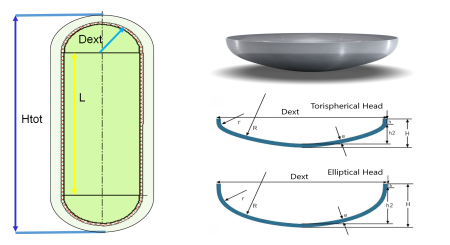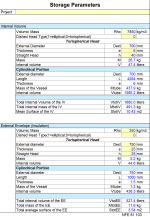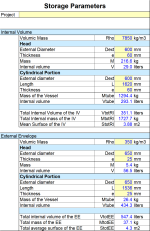Pressure Vessel Mass with Insulation

Description
- This Sheets intends to ease the design of pressure vessels and their heads. It only gives physical parameters as Mass Volume or Surface. It is very useful in early design phases or when doing a BOQ or cost estimate.
- Elliptical heads, Torispherical heads and Hemispherical heads are available for calculation.
- The norm NFE 81 103 was used as a base, however, the sheet can be used independently from a code or standard.
Elliptical heads, torispherical heads, and hemispherical heads are common types of heads used in pressure vessels and storage tanks. These heads can be calculated using various standards, including the NFE 81 103, which is a French standard for dished ends.
Elliptical heads: Elliptical heads, also known as 2:1 elliptical heads or semi-ellipsoidal heads, have a shape that resembles an ellipse. The ratio of the major axis to the minor axis is typically 2:1. To calculate the volume and surface area of an elliptical head, you can use the following formulas: Volume (V) = (1/6) ? h (3a^2 + h^2) Surface area (A) = 2 ? a (a + (h^2 / (2 * sqrt(a^2 - (a/2)^2)))) Where: a = major axis / 2 h = minor axis
Torispherical heads: Torispherical heads are composed of a spherical crown, a knuckle, and a straight flange. These heads are widely used in pressure vessels because of their geometric simplicity and ease of fabrication. To calculate the volume and surface area of a torispherical head, you can use the following formulas: Volume (V) = ((2 ?^2 R_k D^2) / 3) + ((? D^3) / 12) Surface area (A) = 2 ? D * (R_k + (D / 4)) Where: R_k = knuckle radius D = diameter of the head
Hemispherical heads: Hemispherical heads have a shape of half a sphere. They are often used in high-pressure applications due to their uniform stress distribution and resistance to cracking. To calculate the volume and surface area of a hemispherical head, you can use the following formulas: Volume (V) = (2/3) ? R^3 Surface area (A) = 2 ? R^2 Where: R = radius of the hemisphere
These calculations are general and may be used independently of a specific code or standard. However, it's essential to follow applicable codes, standards, and engineering practices when designing pressure vessels or storage tanks to ensure safety and compliance with relevant regulations. Always consult with a qualified engineer for accurate calculations and designs.
Calculation Preview
Full download access to any calculation is available to users with a paid or awarded subscription (XLC Pro).
Subscriptions are free to contributors to the site, alternatively they can be purchased.
Click here for information on subscriptions.



